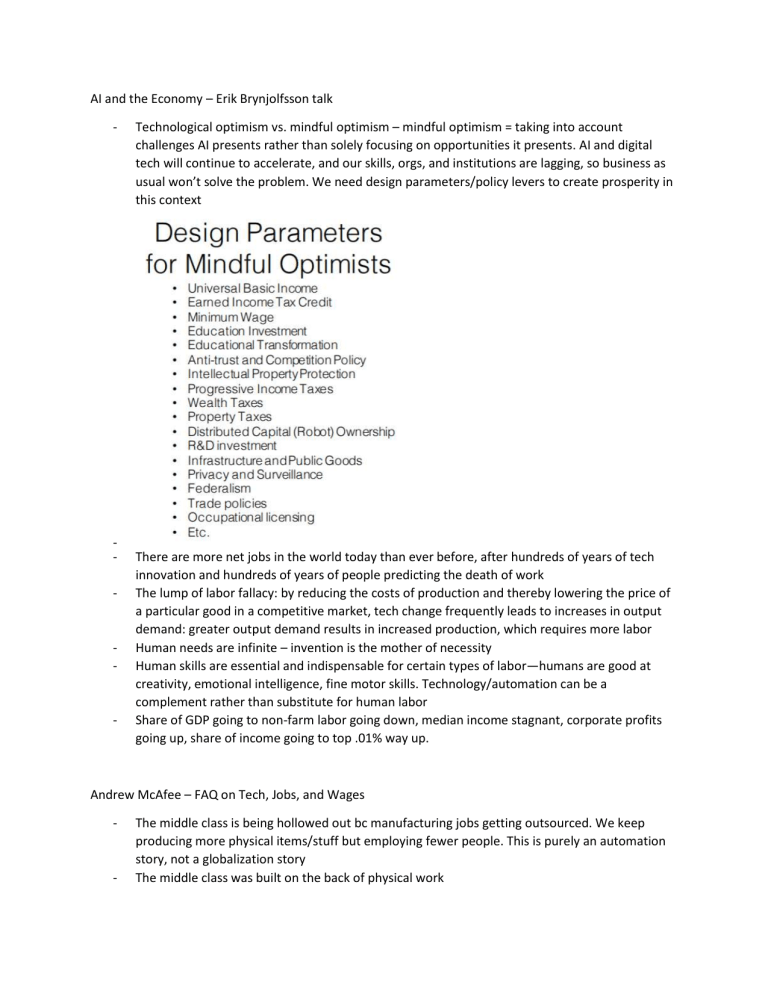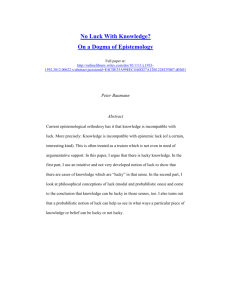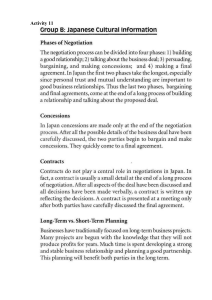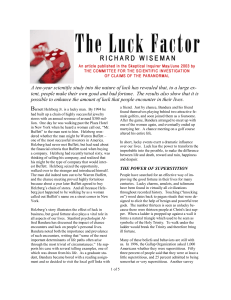
AI and the Economy – Erik Brynjolfsson talk - - - - Technological optimism vs. mindful optimism – mindful optimism = taking into account challenges AI presents rather than solely focusing on opportunities it presents. AI and digital tech will continue to accelerate, and our skills, orgs, and institutions are lagging, so business as usual won’t solve the problem. We need design parameters/policy levers to create prosperity in this context There are more net jobs in the world today than ever before, after hundreds of years of tech innovation and hundreds of years of people predicting the death of work The lump of labor fallacy: by reducing the costs of production and thereby lowering the price of a particular good in a competitive market, tech change frequently leads to increases in output demand: greater output demand results in increased production, which requires more labor Human needs are infinite – invention is the mother of necessity Human skills are essential and indispensable for certain types of labor—humans are good at creativity, emotional intelligence, fine motor skills. Technology/automation can be a complement rather than substitute for human labor Share of GDP going to non-farm labor going down, median income stagnant, corporate profits going up, share of income going to top .01% way up. Andrew McAfee – FAQ on Tech, Jobs, and Wages - - The middle class is being hollowed out bc manufacturing jobs getting outsourced. We keep producing more physical items/stuff but employing fewer people. This is purely an automation story, not a globalization story The middle class was built on the back of physical work - - The US has a very mobile workforce, but mobility is going down—if you lose your middle class job you’re likely to find a new job, but one that pays less Social decay in white working class communities: o Increase in white middle aged mortality – chronic liver disease, suicide, acute alcohol and drug poisoning o White working class communities: Divorce rates skyrocketing for bottom 30%, # kids being raised w both biological parents dropping for bottom 30%, incarceration rates rising for bottom 30% McAfee’s caution: if current trends continue, the people will rise up before the machines do (e.g. Trump and Brexit) Jeffrey Sachs – Robotics, AI, and the Macro-Economy - - - - Manual work has declined from around 70% of the population as of 1900 to around 10% today – and AI likely to accelerate the decline further Average number of hours at work has gone down—on any given day, 3 hours 10 minutes of work. High level of living/well-being on average, BUT We need to consider how to share the well-being. There’s high unemployment of low-skilled workers, rising income inequality, other side effects of this social inequality e.g. obesity epidemic “If there’s a little bit of distribution of humanity in this country, it’s not so hard to share the wellbeing that’s created by all this technology” – technological changes have expanded the pie and changed the income distribution both (gains concentrated at the very top—that’s why the luddites tried to smash the machines; cotton pickers had to do migration north bc they had to find new jobs even though size of economy grew) It’s not that everyone should be a coder. It’s not about how many jobs we can create, it’s how much well-being we can create and how we can redistribute the benefits - Economists kind of fucked up --- revealed preference is maybe useful for estimating demand curve, but useless for inferring values for AI. Instead, we can transform and reinvigorate moral thinking. Don’t just observe behavior but instead get the ethicists engaged New Yorker article on UBI - - - “People generally have a visceral reaction to the idea of a universal basic income. For many, a government check to boost good times or to guard against starvation in bad ones seems like an obviously humane measure. Others find such payments monstrous, a model of waste and unearned rewards. In principle, a government fixes the basic income at a level to allow subsistence but also to encourage enterprise and effort for the enjoyment of more prosperity. In the U.S., its supporters generally propose a figure somewhere around a thousand dollars a month: enough to live on—somewhere in America, at least—but not nearly enough to live on well.” UBI of 1k/monthly would be $3.9 trillion/year, close to the current expenditure of the entire fed govt. “Observers often are squeamish about that proposition. Junkies, alcoholics, scam artists: Do we really want to hand these people monthly checks? In 2010, a team of researchers began giving two-hundred-dollar payments to addicts and criminals in Liberian slums. The researchers found that the money, far from being squandered on vice, went largely to subsistence and legitimate enterprise. Such results, echoed in other studies, suggest that some of the most beneficial applications of a U.B.I. may be in struggling economies abroad … Before GiveDirectly sent everyone [in a small village in Kenya] the equivalent of twenty-two U.S. dollars a month (delivered through a mobile app), Village X had dirt roads, no home electricity, and what Lowrey genteelly calls an “open defecation” model for some families. Now, by her account, the village is a bubbling pot of enterprise, as residents whose days used to be about survival save, budget, and plan. (The payments will continue until 2028.)” Arguments for UBI o Social safety net, and way to allow people to not have to spend their entire lives simply working to help create profits that just go to the 1% o - - - Way to manage industry side effects such as low labor costs and displacement of workers o If workers no longer compelled to take any available job to put food on the table, work must be worth their while o Alleviates moral debt – wealthy can feel less guilt as they gain more wealth o Meritocracy—if everybody gets a strong boost off the blocks, the ultra-affluent can believe they got their wealth by merit/create a narrative that casts their wealth as a reward rather than inherited or unfairly earned Arguments against UBI o What was meant to be a floor can easily become a ceiling: a society with a basic income has no pressure to pay employees a good wage, because the bottom constraint, subsistence, has fallen away E.g. in the gig economy, the argument is that most workers merely work those jobs as supplemental income so they can get away w paying paltry wages o “Any program to protect the workforce in the long term must go deeper than just redisbursing cash or benefits. Such a solution would need to privilege public interests, not just public awards … Simply lifting the minimum-income level leaves the largest, most defining foundations of inequality intact.” Andrew Yang idea of “human capitalism:” “For example, a journalist who uncovered a particular source of waste, an artist who beautified a city, or a hacker who strengthened our power grid could be rewarded with Social Credits” Chris Hughes proposal- $500/mo for every adult in a household making less than $50k (this would lift 20mil over the poverty line and cost $300bil/yr). Not a lot of money but “The further you get from subsistence, the easier it is to ask fundamental questions like: What do I want, and how do I get it?” – allows for the assurance of choice, if not actual dollars o “Why spray so much money over people doing fine when you could direct cash as needed?” o Makes program palatable to those who cannot stomach anything resembling government handouts On a new theory of justice – review essay by William Ewald of Eric Rakowski’s Equal Justice - - Equality of fortune: as a matter of justice, the consequences of random lucky and unlucky events should be evened out. Nobody should have more resources than anybody else simply as a matter of pure chance. Principle of luck: o Differences in holdings arising from variations in option luck are unobjectionable, so long as everybody has a chance to make the gamble in question: those who win are entitled to keep their winnings; those who lose have no right to complain of their losses and may not look to society for compensation. People must take credit or blame for their decisions and the consequences that follow. o Consequences of brute, unmerited, unchosen windfalls should be evened out. The lucky must share; the unlucky are entitled to compensation. o o o KC personal opinion: a generally interesting heuristic but I agree that it would be practically impossible to sort out the contributions of brute and option luck in every individual case, and also that “most real-life lucky events are not the product of a single cause, but of a chain of causes, some of which reflect brute luck, and some option luck.” (stock purchase hypo on pp. 16-17). Also there are some startling implications e.g. the kidney transplant hypo on p. 10. Also how can we apply this heuristic in a real-world context, when there isn’t a just initial distribution of resources among people-- people don’t have a similar set of options available to them bc we have so many structural inequalities and weird oppressive cultural norms. The theory is completely unadministrable. What is the point of a theory that is in “independent of the existence of any state,” as Rakowski himself describes in his introduction? I agree w/ this comment from the reviewer: “Morally speaking, not all option gambles were created equal, nor should they be treated the same way by society. Some are to be honored and subsidized even if they fail; some to be encouraged and rewarded if they succeed; some to be tolerated and taxed; some to be frowned upon and regulated; and some to be prohibited altogether.” Also agree w this comment from the reviewer: “what states can be expected to deliver is not so much equal justice as rough justice.”


